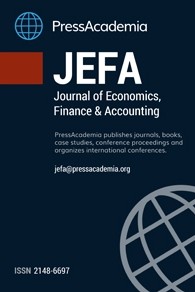DOES ISLAMIC BANKING HAVE A FUTURE IN GERMANY? SURVEY ON GERMAN MUSLIMS PERCEPTIONS
Purpose– Islamic banking is a new concept in Germany. Islamic banks in Germany aspire being the hub for Islamic finance in Europe and see their potential in the growing Muslim population. This paper aims to contribute to the limited literature from the target group’s perspective, to analyze their perceptions and to test whether the promised potential exists in reality. Methodology- An online survey with questions developed according to the characteristics of awareness, relative advantage, complexity, uncertainty and promotion was conducted to Muslims living in Germany. Findings- The results show that there is awareness but little knowledge towards Islamic banking and its’ concepts due to insufficient communication. The main reason attracting to Islamic banking is religion. In this regard peer groups play an important role. Furthermore, the findings indicate future potential for Islamic banking Germany. Conclusion– In general there is a positive perception towards Islamic banking. Islamic banks have a rich customer portfolio and have the potential to increase their market share in Germany by offering suitable products and providing easy access to these products.
Keywords:
Islamic banking, Islamic finance, Interest-free banking Germany, German Muslims,
___
- Ainley, M., Mashayekhi, A., Hicks, R., Rahman, A., & Ravalia, A. (2007). Islamic Finance in the UK: Regulation and Challenges. Financial Services Authority
- Al Baraka (2018). Press Release- Al Baraka Launches Europe’s Fırst Interest Free, Digital only Banking Service “insha” in Germany. Retrieved May 21, 2020, from https://www.albaraka.com.tr/pdf/Albaraka-insha-berlin-event-PR-Final-01102018.pdf (21.05.2020)
- Alharbi, A. (2016). Development of Islamic Finance in Europe and North America: Opportunities and Challenges. International Journal of Islamic Economics and Finance Studies, 2 (3), 109-136. doi:10.12816/0036633
- Asutay, M. (2012). Conceptualising and Locating the Social Failure of Islamic Finance: Aspirations of Islamic Moral Economy vs the Realities of Islamic Finance. Asian and African Area Studies, 11 (2), 93-113. available at SSRN: https://ssrn.com/abstract=2089793
- Beloucif, A., Boukhobza, T., & Baumruck-Lawrenz, L. (2017). A study of German consumers’ perception of Islamic banking. Int. J. Islamic Marketing and Branding, 2 (1), 37-64. doi: 10.1504/IJIMB.2017.10004189
- Casper, M., & Allali, A. (2017). Islamic Finance Made in Germany – A Case Study on Kuveyt Türk (KT Bank): Germany's First Islamic Bank. Available at SSRN: https://ssrn.com/abstract=3077366 or http://dx.doi.org/10.2139/ssrn.3077366
- Colditz, K. (2009). Islamic banking – a worthwhile challenge for German banks?. Master thesis, Technische Hochschule Nürnberg, Nürnberg
- Ecke, D. (2012). Islamic Banking: Grundlagen und Potenzial in Deutschland. Hamburg
- El-Gamal, M. (2007). Islamic Finance: Law, Economics and Practice. Cambridge, Cambridge University Press
- Di Mauro, F., Caristi, P., & Couderc, S. et al. (2013). Islamic Finance in Europe. ECB Occasional Paper No. 146, available at SSRN: https://ssrn.com/abstract=2251204
- Gleisner, F., Hackethal, A., & Rauch, C. (2009). Migration and the retail banking industry: An examination of immigrants' bank nationality choice in Germany. European Journal of Finance 16(5), 459-480. doi: 10.1080/13518470903314410
- Hassan, M. Kabir, & Sirajo, A. (2017). An Empirical Literature Survey of Islamic Banking. Available at SSRN: https://ssrn.com/abstract=2980516 or http://dx.doi.org/10.2139/ssrn.2980516
- Farhoush, A., & Schmidt, N. (2012). Chapter 12: Islamic Finance in Germany: Trends, Opportunities, and Potential. In K. Hassan; M. Mahlknecht (Editors), Islamic capital markets: Products and strategies (pp. 235-266). Chichester, West Sussex, U.K: Wiley. doi: https://doi.org/10.1002/9781119206040.ch12
- Islamic Financial Services Board (2018). Islamic Financial Services Industry Stability Report
- Junius, A. (2007). Islamic Finance: Issues Surrounding Islamic Law as a Choice of Law under German Conflict of Laws Principles. Chicago Journal of International Law 7(2), 537-550. Available at: https://chicagounbound.uchicago.edu/cjil/vol7/iss2/10
- Parashar, S. P. (2010). How Did Islamic Banks Do During Global Financial Crisis? Banks and Bank Systems, 5(4), 54-62.
- Pew Research Center (2017). available at: https://www.pewforum.org/2017/11/29/europes-growing-muslim-population/
- Rahman, N. U. (2012). Attitude of Muslims towards Islamic Banking and Finance in the NorthWest of England: A Socio-Economic Perspective, Durham theses, Durham University. E-Theses Online: http://etheses.dur.ac.uk/6394/
- Samad, A. (2004). Performance of interest-free Islamic banks vis-à-vis interest-based conventional banks of Bahrain. IIUM Journal of Economics and Management 12(2), 1-15.
- Schuster, F. (2013). Perspektiven des Islamic Banking im deutschen Bankwesen. Deutsches Institut für Bankwirtschaft – Schriftenreihe, Band 10 (b)
- Sobol, I. (2015). Islamic Banking in the European Union Countries. European Integration Studies 9. doi: http://dx.doi.org/10.5755/j01.eis.0.9.12806
- Wahl-Immel, Y. (2018, January 19). Finanzgeschäfte nach Allah - Islamisches Banking wächst. Retrieved May 20, 2020, from https://www.fnp.de/wirtschaft/finanzgeschaefte-nach-allah-islamisches-banking-waechst-10430531.html
- Usai, D. (2016). Islamic banking as an alternative to conventional banking. HFU Business School, International Business Term Paper
- Yayın Aralığı: Yılda 4 Sayı
- Başlangıç: 2014
- Yayıncı: PressAcademia
Sayıdaki Diğer Makaleler
Masoud GHAZAVİ, Sema Bayraktar TUR
Ciydem CATAK, Sena Yılmaz ARSLAN
PIIGS ÜLKELERİNİN BORÇ SORUNU VE PARASAL BİRLİK DÜZEYİNDE OLUŞTURULAN KURTARMA MEKANİZMALARI
ARAS VE MOOSRA YÖNTEMLERİNİN PERFORMANS SONUÇLARININ KARŞILAŞTIRILMASI: AMERİKA KITASI ÜLKELERİ
TÜRKİYE’DE LOJİSTİK VE ULAŞTIRMA HARCAMALARI VE İHRACAT İLİŞKİSİNİN EKONOMETRİK ANALİZİ
